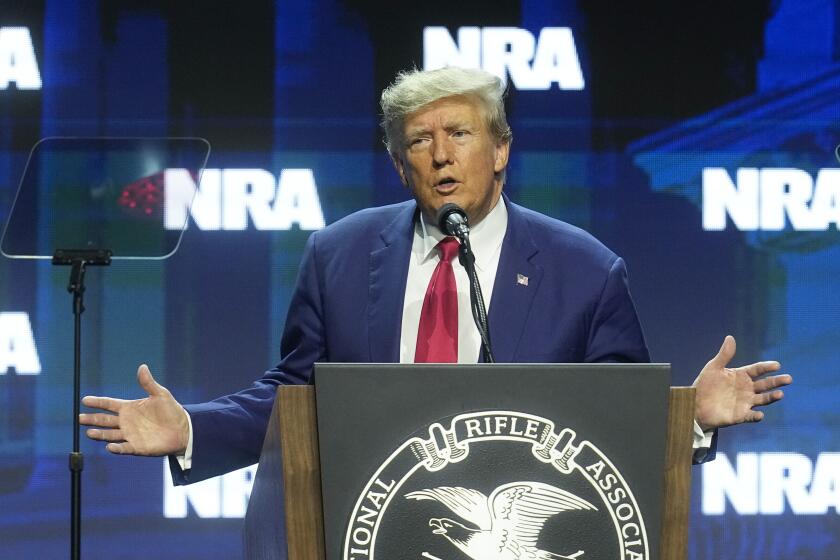Column: Boeing executive steps down over a 33-year-old essay. âCancel cultureâ has gone off the rails

I used to argue with my very progressive mother about whether women belonged in combat.
Women create life, she told me. They should not be in the business of snuffing it out.
I think her rationale probably sprang from her pacifist tendencies, but hers was not an unusual point of view.
Indeed, American women were not officially allowed to serve in all combat roles until 2016.
When I read this week that Boeingâs new communications chief is out of a job for penning an essay almost 33 years ago opposing women in combat, which he had long since renounced, I have to admit, I was surprised. I probably should not have been.
After all, we are in the midst of this decadeâs great reckoning, which was unleashed by women who were sick and tired of being sexually harassed and violated by powerful men. The #MeToo movement, among other things, caused a great culling of abusive male bosses that continues to this day. The current iteration of the reckoning is more complicated. At its roots are a rage against racism and sexism and longstanding social inequities that have manifested themselves in every aspect of American life. There is, in addition, something relatively new afoot. It has to do with the nebulous concept of safety.
This idea, as Jonathan Chait recently wrote in New York magazine, âfrequently collapses the distinction between words and action ⌠by describing opposing beliefs as a safety threat.â I first encountered the concept during free-speech debates on college campuses, where, for instance, students were virulently opposed to inviting, say, a right-wing provocateur like Milo Yiannopoulos onto campus, because he made them feel unsafe.
So, for example, when Republican U.S. Sen. Tom Cotton wrote an overheated essay urging the president to call out the military to quell violent protests, he was accused of endangering the safety of Black reporters at the New York Times, where his essay appeared. The opinion editor was forced out for his poor judgment, both because the piece was shoddily edited and also because he hadnât read it before publication.
Around the same time, a young political data analyst who worked on the reelection campaign of President Obama tweeted out a Princeton study that found â to greatly simplify the work â that violent protests after the assassination of Martin Luther King Jr. reduced the Democratic vote, and peaceful protests increased it. The analyst, David Shor, was attacked for, among other things, âanti-Blacknessâ and soon lost his job.
As Chait put it, âSince criticism of violent protests is racist, and racism obviously endangers Black people, an act as seemingly innocuous as sharing credible research poses a threat to safety.â
Of course, Shor was not criticizing anything.
He was highlighting a research paper produced by Omar Wasow, a Black political scientist who co-founded the social networking site BlackPlanet. Wasow has spent 15 years studying civil rights protests of the 1960s, and has, as he tweeted, âpaid particular attention to how nonviolent and violent actions by activists & police influence media, elites, public opinion & voters.â
Seems pretty innocuous, but the very act of studying violent protests is perceived in some quarters as inappropriate, or ânot helpful,â as one history professor told the Chronicle of Higher Education. Even raising the question, University of Michigan Professor Heather Ann Thompson told the Chronicle, puts an undeserved onus on people protesting injustice.
::
In 1987, Niel Golightly was a young Navy pilot when he wrote a long piece called âNo Right to Fightâ in Proceedings, the magazine of the U.S. Naval Institute. Although he was trying to make a serious argument, the piece reads like parody straight out of the He-Man Womanâs Haters Club.
âWomen do not naturally band together for ritual comradeship,â he wrote, in a passage characteristic of the entire ridiculous piece. âTheir enormous personal courage usually reflects their loyalties to family and home rather than to each other and âthe group.â But while feminine loyalties are arguably more civilized, productive, and intellectually defensible than the male compulsion to be part of a group, it nevertheless remains that the bonding imperative is crucial to the collective mettle of men in combat.â
The essay was recently brought forward, according to Boeing, by an employee who used it as the basis of an internal anonymous ethics complaint against Golightly.
Apparently, Boeing officials, already reeling from a series of devastating setbacks, did not want to face another controversy at a moment when the company says it has made an âunrelenting commitment to diversity and inclusion.â
Apologies and renunciation were not enough.
In a statement released by Boeing, Golightly explained that the article was âa 29-year-old Cold War Navy pilotâs misguided contribution to a debate that was live at the time.â
He said that his argument âwas embarrassingly wrong and offensive,â and that the criticism that followed âquickly opened my eyes, indelibly changed my mind, and shaped the principles of fairness, inclusion, respect and diversity that have guided my professional life since.â
This is a fraught moment for discussions about race and gender. Emotions are raw and, as we see in the current discussion about âcancel culture,â free speech and responsibility, there is little room for error.
I just donât see how firing someone for something they wrote â and disavowed â decades ago, helps advance the cause of justice. And yes, to my surprise as well as yours, I am defending a middle-aged white man Iâve never met.
I guess we could all use a little compassion and empathy right about now.
@AbcarianLAT
More to Read
A cure for the common opinion
Get thought-provoking perspectives with our weekly newsletter.
You may occasionally receive promotional content from the Los Angeles Times.











